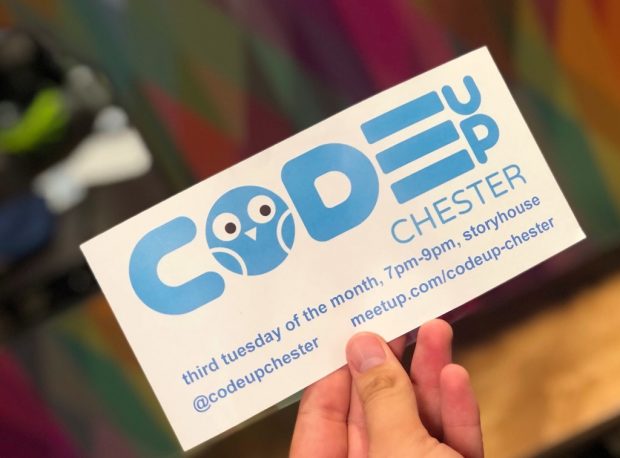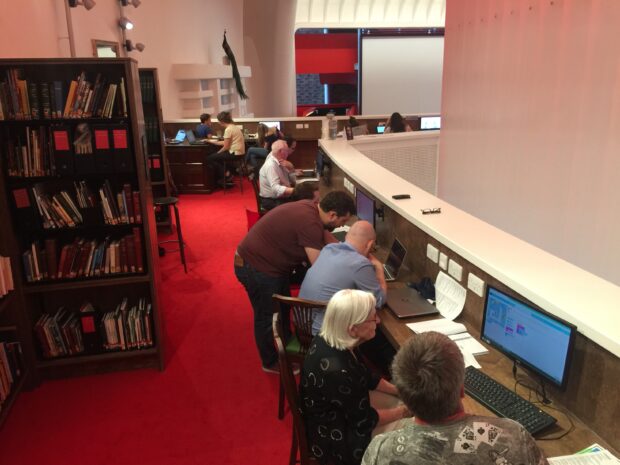 [Editor’s note: Guest blog post written by Liam Cookson, Senior Customer Service Representative for Cheshire West and Chester Libraries, and main organiser for CodeUp Chester. There has been growing interest in adult coding clubs in libraries recently, and lots of library services are experimenting with different offers. Tell us about code clubs you are running in the comments section following this post]
[Editor’s note: Guest blog post written by Liam Cookson, Senior Customer Service Representative for Cheshire West and Chester Libraries, and main organiser for CodeUp Chester. There has been growing interest in adult coding clubs in libraries recently, and lots of library services are experimenting with different offers. Tell us about code clubs you are running in the comments section following this post]
CodeUp is an adult version of code club – providing free tuition and advice for people who want to learn to code. There are a number of branches (mostly based in the north of England), the flagship one being in Manchester with almost 4,000 members. Chester’s branch currently has over 400, and we’ve been growing exponentially over the past few months. We have a mix of attendees, from complete beginners and learners, to intermediate and expert level developers with a wealth of skills and experience.

Why did I get involved?
I’m not an expert coder by any means, and I’m the first to admit that to anyone. With my involvement leading code clubs for young people and other digital activities in my library service, I got a feel for it and started learning Python. I wanted to start a CodeUp branch in my city as the nearest meetings that were friendly to beginners were either too far to travel, or charged a fee.
Librarians often want to host adult coding sessions, and I can see why because they’re so worthwhile and, depending on your area, relatively hard to come by. But they require specialist knowledge that not just anyone has - different to code clubs for children, where session leaders have reported that you only need to keep one step ahead. As a learner I wouldn’t be able to lead the sessions myself or debug anyone’s code, but as the organiser of your own CodeUp branch you don’t necessarily need to – your job is to arrange the space, greet people and buddy them up with ‘mentors’ who can offer help, and make sure you have enough volunteers.
How did I start?
To get together a number of volunteers, I got in touch with a local developer group and introduced myself, offered a talk and successfully engaged people with a diverse set of skills. Similarly, local recruitment agencies and companies who hire developers were great in getting the word out. Since CodeUp is an informal learning environment, we don’t enforce any specific time commitments on our volunteer mentors, which is a bonus to volunteer recruitment.
Monthly sessions are usually what I refer to as ‘learner-led’ – we don’t have a set agenda, or any one person leading the session. Beginners are grouped with mentors with appropriate skills or they can drift amongst smaller groups where interesting conversations are taking place, and we help them get over that low confidence barrier and enable those light bulb moments.
Occasionally when we get a generous offer, we can provide specific workshops or talks on a certain programming language or method.
Advertising meetings
CodeUp itself advertises its meetings on Meetup.com. Meetup is an invaluable resource for us – somehow it’s proved to be exactly the right platform to attract the audience we need, and I wasn’t even aware of it before I started my CodeUp branch.
It contains lots of groups for developers and ones to do with technology, but it’s also full of community, culture and friends groups, so I highly recommend everyone joining - and seeing how you might use it for other library events or programmes. Usually to host your own events on Meetup there’s a charge, but CodeUp cover this cost centrally in return for you running your own branch.
Coding in libraries
Libraries are the perfect home for CodeUp sessions to take place. The space doesn’t necessarily have to be private, but it should allow attendees to set up their own computers on shared tables, with plug sockets or extension leads nearby.

Part of CodeUp’s inclusive ethos means that all meetings should be free, and in the evening so people can attend after work. In many places this may mean extending opening hours as a special arrangement once a month. CodeUp Chester currently runs from 7pm-9pm in our home of Storyhouse, which luckily for us is open until 11pm every day.
Tips for running your own group
It might seem like a real feat to take on all by yourself, and it was daunting to me at first. But I can’t take all the credit for our successes, as I extended a call to anybody interested, expert or not, to help me organise and run the operations of CodeUp Chester – who are now regular attendees who appreciated the work we did now contribute towards shaping our meetings and securing our future.
If you’re interested in running your own branch but anticipate needing an extra hand, I’d recommend building a team of co-organisers.
Anyone interested in hearing more can contact me – I’d be happy to talk. Alternatively, you can visit the CodeUp website for more information, or even better, visit your nearest CodeUp branch and see the learning first hand.
---------------------------------------------------------------
Please note, this is a guest blog. Views expressed here do not necessarily represent the views of DCMS or the Libraries Taskforce
1 comment
Comment by Rachel posted on
This sounds great. I am also self-taught and teaching myself Python to offer basic Python with Raspberry Pi's. I tend to run a club for 9-11 year olds and their parents as family learning. I like the idea of adults coming together though sharing their skills. One issue here is the later evenings as I already work overtime and my other nights are busy personally. I don't want to sound negative but now most of our libraries close at 5pm (the main one closes twice a week at 7pm). We have however recently partnered with University of East London offering coding with robotics for 11+